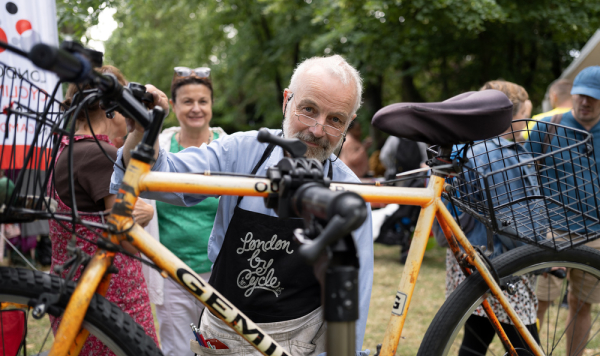Stitch Social is a series of sustainable craft workshops geared around transforming second hand textiles into something new and repairing clothes. The programme offers north London residents a chance to learn how to upcycle textiles, reduce waste and connect with others in the community. It is run by South Hampstead and Kilburn Community Partnership (SHAK), a resident-led charity and one of the recipients of the 2025-26 North London Community Fund.
We spoke to Alexandru Sones-Dawkins, Community Coordinator at SHAK and some Stitch Social participants about their experiences:
Where did the idea for Stitch Social begin?
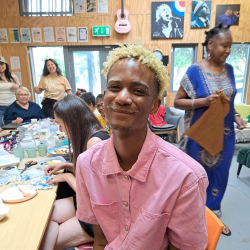
Before my role as Community Coordinator at SHAK, I was a youth associate at Metroland Cultures. After completing the program and final exhibition, I continued to maintain my relationship with Metroland which continued into my current tenure. I advertised our Community Chest fund, which was designed help initiate community projects in Kilburn through a kick start grant, and Kim Chin, a resident artist at Metroland was one of the people who applied, pitching the initial concept of Stitch Social. We trialled the workshops for six weeks and it was an immediate success, establishing regular attendees from all over the city and growing to become one of SHAK’s flagship community projects.
Why was it important for you to set up a programme which focuses on repair and repurposing?
Environmental consciousness is at the heart of the Community Champions programme’s ethos, and with Stitch Social we already had a model that we could expand on with a refined emphasis on sustainability with textiles. With Kilburn being among the top 10% of deprived areas in the city, the cost-of-living crisis has taken a toll on some families disproportionately, so it was important for me to think about ways to combat overhead living costs - and clothing is an often-overlooked and necessary expense. Creating a pathway for residents to learn clothing repair techniques as well as ways to creatively repurpose items into stylised designs meant we were not only addressing environmental waste but also giving residents tools for financial resilience and personal expression.
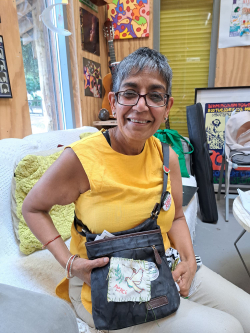
One attendee, Ashika, shared, “I love not having to go to a shop to buy new material as I hate waste. People are just chucking things, not using them, not repairing. This project meets my needs in all kinds of ways.” For her, the act of stitching was not just practical but deeply therapeutic, helping her manage mental health challenges through mindfulness and creativity.
Shak is a charity dedicated to supporting residents and young people living in an area of high deprivation. What does Stitch Social mean to the people that attend?
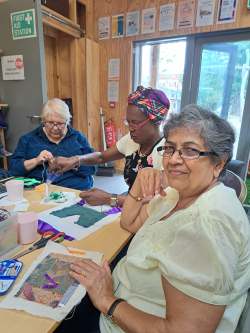
Stitch Social first and foremost, is a safe space. We are emphatic and want to place focus on the ‘social’ element of the project. This is because some participants stop by the sessions solely for a catch up with other members even when their work has been completed. Stitch Social is an inclusive space where people from all backgrounds can come together to socialise, have a laugh and discuss current affairs, all through the shared medium of stitching.
Ashika reflected, “It’s just really lovely to meet people of all ages and ranges. I learnt things from a younger generation. The mix of cultures is great too. Instead of buying other people’s art, it’s doing — it’s taking an active part.” Pragna, who had recently reconnected with her sister, Ashika, through the sessions, said, “We’ve lost almost four members of our family in eight years. This is a time to bond with my sister. It’s nice to connect with new people, new faces, as well as rebuilding the relationship with my sister.”
For many participants, the social benefits are the most rewarding aspect; the environmental impact, while crucial, becomes second nature, almost like a by-product of a project that prioritises community.
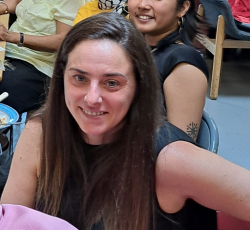
One newer attendee, Sacha, shared, “It’s been really nice to switch off and have a break from the computer and meetings. I really hope what we’ve made will go back to the community somehow. I’d love it if some bunting ended up in a shop window.”
What has surprised you about the Stitch Social programme
I have been surprised by the extent of the project’s reach. Initially a Kilburn-targeted project, and now borough-wide, it has been lovely seeing people from all corners of the city travel down on a weekly basis to attend the sessions. It’s clear the project resonates beyond its original scope, meeting needs that aren’t just local, but shared by communities across London, and it has been an honour to produce this project alongside Kim, our amazing and dedicated facilitator.
If you would like to come along to Stitch Social, the programme will start again in autumn 2025. Keep an eye on SHAK's instagram page and our event page for more details.


